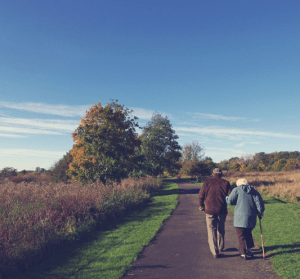What is the main purpose of the trial?
This trial aims to determine whether a patch containing the drug rivastigmine, worn on the skin, reduces the number of falls in people with Parkinson’s.
Why is it important?
Falls in Parkinson’s
Falls are a very frequent complication of the disease affecting 60% of people with Parkinson’s every year. Having a fall can be devastating, resulting in broken bones, injuries and hospital admission. In addition, people lose confidence in their walking and ability to get out and about so can become more isolated and anxious.
Why these falls happen
The loss of the chemical dopamine in the brain causes walking in Parkinson’s to become slower, unsteady and irregular. People with the condition are therefore at a very high risk of falling. To some extent, people can compensate for these changes by paying more attention to their walking. However, Parkinson’s also diminishes memory and thinking ability. This decreases people’s ability to pay attention to their walking, especially when doing something else at the same time.
Potential treatment
Cholinesterase Inhibitors are drugs that are currently used to treat people with memory problems in Parkinson’s and other conditions like Alzheimer’s disease. The effect of these drugs on falls in Parkinson’s has been tested in 3 small trials showing that treatment has the potential to almost halve the number of falls.
How is the trial being conducted and information collected?
Participants with Parkinson’s that have consented to take part in the study are applying one transdermal patch each day for 12 months. The trial is double-blinded, meaning that neither the participant nor the research team know whether the participant is applying the active drug or placebo (no drug) patch. The participants document any falls in a diary and return them to us each month in pre-paid envelopes. After 3, 6 and 9 months the participants also complete a questionnaire to assess their quality of life.
Where is the trial taking place?
Apart from the two hospital appointments at the start and end of the trial, the trial takes place at home. You can see a map and list of participating sites here.

